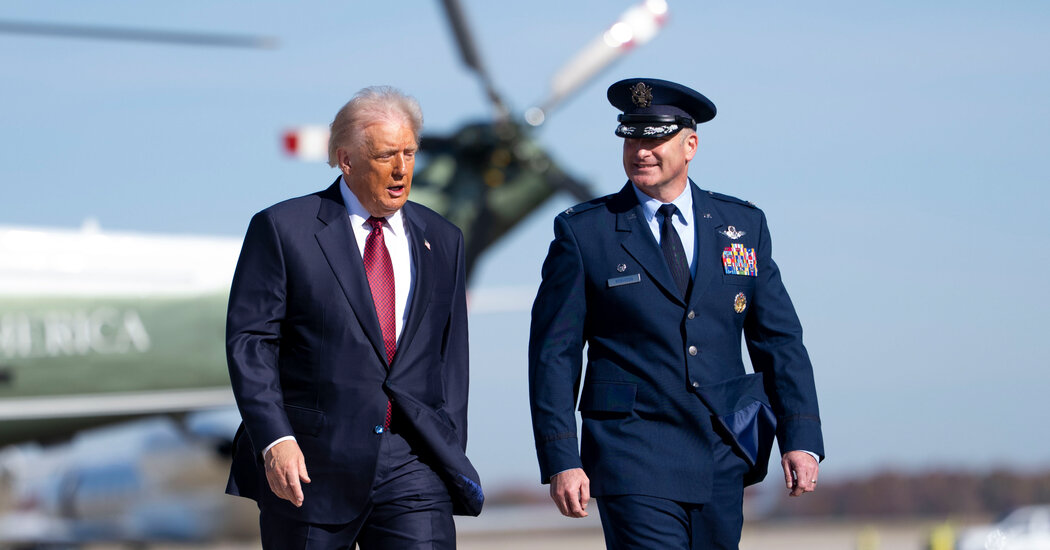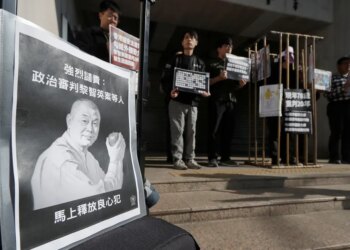
A secret Justice Department memo blessing President Trump’s boat strikes as lawful hangs on the idea that the United States and its allies are legally in a state of armed conflict with drug cartels, a premise that derives heavily from assertions that the White House itself has put forward, according to people who have read it.
The memo from the department’s Office of Legal Counsel, which is said to be more than 40 pages long, signed off on a military campaign that has now killed 80 people in the Caribbean Sea and eastern Pacific Ocean. It said such extrajudicial killings of people suspected of running drugs were lawful as a matter of Mr. Trump’s wartime powers.
In reaching that conclusion, the memo contradicts a broad range of critics, who have rejected the idea that there is any armed conflict and have accused Mr. Trump of illegally ordering the military to commit murders.
The administration has insisted that Mr. Trump has the authority to lawfully order the strikes under the laws of war, but it has provided scant public details about its legal analysis to buttress that conclusion. The accounts of the memo offer a window into how executive branch lawyers signed off on Mr. Trump’s desired course of action, including appearing to have accepted at face value the White House’s version of reality.
The memo, which was completed in late summer, is said to open with a lengthy recitation of claims submitted by the White House, including that drug cartels are intentionally trying to kill Americans and destabilize the Western Hemisphere. The groups are presented not as unscrupulous businesses trying to profit from drug trafficking, but as terrorists who sell narcotics as a means of financing violence.
Based on such claims, the memo states that Mr. Trump has legitimate authority to determine that the United States and its allies are legally in a formal state of armed conflict with “narco-terrorist” drug cartels, according to the people who have read the document. The rest of the memo’s reasoning is based on that premise.
For example, the people said, the memo asserts that boats believed to be carrying narcotics are lawful military targets because their cargo would otherwise generate revenue that cartels could use to buy military equipment to wage the purported armed conflict.
And a lengthy section at the end of the memo, they said, offers potential legal defenses if a prosecutor were to charge administration officials or troops for involvement in the killings. Everyone in the chain of command who follows orders that comply with the laws of war has battlefield immunity, the memo says, because it is an armed conflict.
The people who described the memo did so on the condition of anonymity to discuss a sensitive document. Asked for comment, the White House said in a statement that Mr. Trump directed the strikes under his constitutional powers and that they complied with the law of armed conflict.
Since Sept. 2, the U.S. military has attacked 20 boats, either in the Caribbean Sea or the eastern Pacific Ocean, that the administration has said were smuggling narcotics. In announcing the strikes, the administration has cited intelligence but has not put forward specific evidence.
The Trump administration has insisted that its boat strikes are lawful. In September, it told Congress that Mr. Trump had “determined” that the United States was in a noninternational armed conflict, meaning in a war against a nonstate actor, like drug cartels, and that the people it was killing aboard the boats were “combatants.”
Outside specialists in laws governing lethal force have widely criticized that argument, and the administration has not offered any public explanation of the legal analysis supporting its assertion. The omissions have included how it bridged the conceptual gap between drug trafficking and associated crimes, as serious as they are, and the kind of armed attacks that is necessary to create a state of war.
The administration has, however, disclosed that an Office of Legal Counsel memorandum signed off on the operation. And while it has not made the memo public, it has started to let members of Congress and their staff read copies, while providing T. Elliot Gaiser, who leads the office, to answer questions at some briefings.
The memo is said to be framed around a question posed by the White House: whether limited lethal force could be used to stop vessels in international waters that are not registered to any country, in order to curb the flow of narcotics from drug cartels designated as terrorist groups.
In endorsing Mr. Trump’s determination that there is an armed conflict, the memo accepted the White House’s assertions uncritically, according to the people who have read it.
For example, they said, the memo cites the White House’s claim that cartels are responsible for the deaths of tens of thousands of Americans a year. But it does not address the fact that a surge in overdoses over the past decade was caused by fentanyl, which comes from labs in Mexico controlled by Mexican cartels, not by South American cocaine.
The memo also cites violence by drug cartels against the security forces of other governments in the region, like Colombia’s and Mexico’s, and asserts that the United States can attack the cartels as a matter of collective self-defense, the people who have seen the memo said. But it does not address whether any foreign government has requested the United States to defend it by carrying out military strikes on boats in the Caribbean Sea or eastern Pacific Ocean.
Colombia is fighting a Marxist rebel group known as the National Liberation Army, or E.L.N., which traffics in drugs to finance its purchases of weapons but is not traditionally considered a drug cartel. One of the 19 strikes to date, announced on Oct. 19, targeted a boat that the Trump administration said was carrying a shipment linked to E.L.N. But Colombia’s president has demanded that the United States stop striking boats, calling them murders.
The memo is said to treat as significant the fact that the U.S. government has designated a range of Latin American drug cartels as foreign terrorist organizations. The Trump administration itself did that a few months ago at Mr. Trump’s direction.
Applying that label to ordinary drug cartels and criminal gangs was unprecedented and contested, since terrorists are ideologically or religiously motivated violent groups like Al Qaeda. By that standard, the E.L.N., which was designated a terrorist group in 1997, qualifies, but groups that are traditionally understood as drug cartels do not.
The memo’s framing of the boat strikes as a specific effort to destroy the cargos has a different emphasis from the messaging the administration has used to justify the attacks.
The strikes have been widely condemned as murders or a war crime, because even criminal suspects are considered to be civilians, and a military may not deliberately target them if they pose no immediate threat. The United States has traditionally dealt with maritime drug smuggling by intercepting boats and arresting the people on board if a search reveals illicit cargo.
Responding to such criticism, Mr. Trump and members of his administration, like Defense Secretary Pete Hegseth, have declared that the people crewing the boats are “narco-terrorists” and the Trump administration has called them “combatants.”
The memo, however, is said to focus instead on the purported shipments of narcotics aboard, portraying those as the specific targets of the strikes based on the theory that their sale would generate revenue that cartels would use to finance their alleged war efforts.
Brian Finucane, a former State Department lawyer and specialist in the laws of war who has been critical of the Trump administration’s operation, said there was some historical practice for citing international law to justify attacks on things that an enemy uses to fund its wartime combat activities. He pointed to strikes on oil facilities run by the Islamic State in Iraq and Syria and on Taliban-linked drug operations in Afghanistan.
But he criticized the proposition that there was an actual armed conflict with the cartels to start. Regardless, he added, he was skeptical that the specific loads of drugs being hit could meet international law standards for being legitimate military targets, arguing that their connection to any specific military activity seemed attenuated.
“It would be difficult to establish that the cargo on these vessels was a military objective under the law of war because there is no obvious connection between a shipment of drugs and military action by these supposed groups,” he said. “By contrast, ISIS was paying actual fighters in a real armed conflict with the proceeds of its oil sales.”
Another part of the memo, the people said, addresses the lack of congressional authorization for the operation.
The memo, they said, asserts that Mr. Trump has constitutional authority, as commander in chief, to order strikes on his own because he has determined they would be in the national interest and because their anticipated nature, scope and duration would fall short of a “war” in the constitutional sense.
Despite concluding that an armed conflict is underway, the memo also says the operation is not covered by the War Powers Resolution, a 1973 law that requires presidents to terminate deployments of troops into “hostilities” after 60 days if Congress has not authorized them. This part of its reasoning, which has been previously reported, turns on the idea that airstrikes that do not put U.S. personnel in danger should not be interpreted as “hostilities.”
The final section, discussing arguments that could be raised in case of any future prosecutions, is said to be lengthy, broaching, among others, the idea that U.S. personnel have immunity for killing enemy fighters in an armed conflict.
Citing a need to protect society from dangerous narco-terrorist cartels, the memo compares military personnel participating in the strikes to the police who break the speed limits when pursuing a suspect who poses a threat to public safety. Those officers are not considered to have committed a crime.
There have been growing signs that the campaign may escalate to land strikes. Some members of Mr. Trump’s administration have pushed to remove from power Venezuela’s President, Nicolás Maduro, whom they have called the leader of a narco-terrorist cartel.
The Pentagon has moved large amounts of naval-based firepower more appropriate for major land attacks than for striking small boats into the region, and Mr. Trump in public has mused about expanding to land strikes.
If he does, though, the Office of Legal Counsel may need to produce another memo. The existing one does not mention Venezuela or strikes anywhere on land, the people said.
Charlie Savage writes about national security and legal policy for The Times.
The post Memo Blessing Boat Strikes Is Said to Rely on Trump’s Claims About Cartels appeared first on New York Times.



